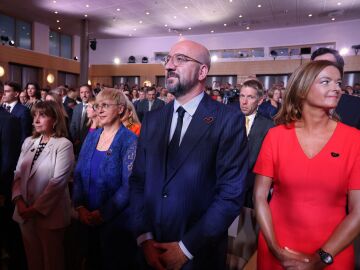
The year 2030 has been the date chosen by Charles Michel, President of the European Council such as the date or appointment of the next possible extension of the European Union (EU)with UkraineMoldova and six other Western Balkan countries with candidate status.
“When preparing the next strategic agenda of the EU, we must set ourselves a clear objective. I believe that we must be prepared – on both sides – for enlargement in 2030”, as Michel declared in his speech at the Bled Strategy Forum (Slovenia) .
“It’s time to tackle the challenge of enlargement for both the EU as well as for the future Member States. It is time to face the challenges with clarity and honesty,” stressed the former Belgian prime minister.
According to Michel, the next long-term budget of the EU will have to include these common objectives. “This is ambitious, but necessary. It shows we mean business. It will build momentum. It will give transformative momentum to reforms and generate interest, investment and better understanding, and it will encourage us all to work together.”
Likewise, Michel recalled, that in 2003 the community path was opened to the countries of the Western Balkanswhich mostly emerged from the wars of decomposition in the former Yugoslavia, but that path has been slow and disappointing for some.
Six countries of the Western Balkans aspire to join the EU
Later, Michel stated that the Russian invasion of Ukraineit was also an attack on European values, democracy, freedom, prosperity and the spirit of cooperation and mutual respect, for which Ukraine and Moldova were granted candidate status last year. Still, the European Council president acknowledged that enlargement presents major challenges as it must ensure that new members meet EU standards in areas such as the rule of law, the fight against corruption and economic reforms.
In addition, he also assured that the EU must strengthen its own institutions and procedures to accommodate new members efficiently. Michel proposed the idea of a “confidence clause” to prevent certain members from blocking the accession process of other neighbours, as has been the recent case of Bulgaria regarding North Macedonia’s aspirations.
Along the same lines, and when addressing the leaders of the Western Balkans, he called for more efforts to strengthen the rule of law, the fight against corruption and organized crime, and above all the solution of bilateral conflicts, which “will be more painful than reforms”. He warned that “there will be no cooperation without reconciliation” and that “there is no room for past conflicts in the EU.”
Six countries of the Western Balkans – Albania, Bosnia-Herzegovina, North Macedonia, Montenegro, Serbia and Kosovo – aspire to join the EU. Montenegro and Serbia are the countries that have made the most progress on the path of entry, but the latter country must normalize its relations with its former province of Kosovo, which declared its independence in 2008 but which Belgrade does not recognize. The dialogue, which they have been carrying out since 2011 with the mediation of the EU and the support of the United States, has yielded few results so far and tensions between the two countries have been present again since last year.
Finally, and as the President of the European Council has advanced, the negotiations on the enlargement of the EU and the calendar that he has proposed this Tuesday will be discussed at the next summit, scheduled for October 26 and 27 in Brusselsand in which he hopes that Bosnia and Herzegovina and Georgia “are back on the table.”
Source: Lasexta
Ricardo is a renowned author and journalist, known for his exceptional writing on top-news stories. He currently works as a writer at the 247 News Agency, where he is known for his ability to deliver breaking news and insightful analysis on the most pressing issues of the day.












